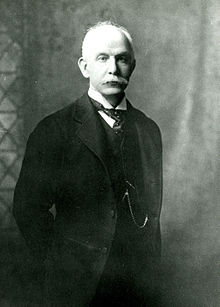From Wikipedia, the free encyclopedia
 |
| Brooks Adams, photographed in 1910 |
He believed that commercial civilizations rise and fall in predictable cycles. First, masses of people draw together in large population centers and engage in commercial activities. As their desire for wealth grows, they discard spiritual and creative values. Their greed leads to distrust and dishonesty, and eventually the society crumbles. In The Law of Civilization and Decay (1895), Adams noted that as new population centers emerged in the west, centers of world trade shifted from Constantinople to Venice to Amsterdam to London. He predicted in America's Economic Supremacy (1900) that New York would become the world trade center.
Adams was a great-grandson of John Adams, a grandson of John Quincy Adams, the youngest son of U.S. diplomat Charles Francis Adams, and brother to Henry Brooks Adams, philosopher, historian, and novelist, whose theories of history were influenced by his work. His maternal grandfather was Peter Chardon Brooks, the wealthiest man in Boston at the time of his death. He was elected a Fellow of the American Academy of Arts and Sciences in 1918.
The 1900 US Census shows Brooks Adams as living in Quincy, Mass. The Census report also shows he married Evelyn Davis around 1890. The census does not show the couple having any children.
____________
Works
The Emancipation of Massachusetts (1887)
The Gold Standard: An Historical Study (1894)
The Law of Civilization and Decay (1895)
America's Economic Supremacy (1900)
The New Empire (1902)
Theory of Social Revolutions (1913)
No comments:
Post a Comment